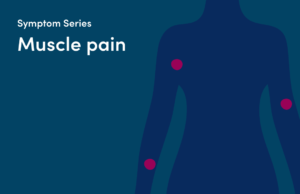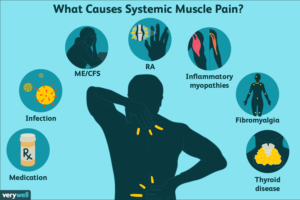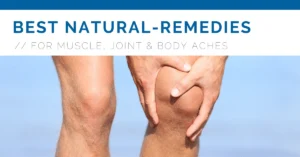Introduction

Muscle discomfort, also known as myalgia, is a frequent problem in people of all ages and lifestyles. Several things, including strenuous exercise and extended desk work, can cause muscle soreness. Although it’s usually not a major problem, knowing the causes of muscle discomfort and how to treat it can greatly enhance general health.
This article explores the causes, remedies, and precautions to help you properly manage muscular soreness.
What Is Muscle Pain?

Myalgia, or muscle pain, means soreness or discomfort in the muscles. It can be mild to severe, localized (in a particular location), or generalized (over the body). Depending on the underlying reason, the duration of muscle discomfort might vary, ranging from a few days to weeks.
Common Symptoms of Muscle Pain

- Soreness or tenderness in the affected area
- Stiffness or reduced range of motion
- Swelling, bruising, or redness in some cases
- Weakness or fatigue in the muscles
Muscle pain is typically easy to identify, but recognizing its source is crucial for finding effective relief and preventing further discomfort.
Common Causes of Muscle Pain

Understanding what triggers muscle pain can help avoid and manage it better. Below are some common causes:
1. Physical Activity and Overexertion
Intense exercise, especially following periods of idleness, can cause muscle discomfort. Weightlifting, running, and other high-impact exercises produce micro tears in muscle fibers, resulting in delayed-onset muscular soreness (DOMS).
2. Poor Posture and Ergonomics
Prolonged sitting, slouching, or repeated movements can cause muscle tension, particularly in the neck, shoulders, and lower back. Poor ergonomics at work or during studying can also cause discomfort.
3. Injury or Trauma
Muscle pain is typically associated with sprains, strains, and fractures. A rapid collision or fall can produce pain when muscles contract to protect the wounded area.
4. Stress and Tension
Emotional stress can cause physical symptoms like muscle aches. Stress frequently causes muscles to stiffen, resulting in aches, particularly in the neck, shoulders, and back.
5. Medical Conditions
Certain medical diseases, such as fibromyalgia, chronic fatigue syndrome, and infections, can cause persistent muscle pain. You should see a doctor if your discomfort persists without a clear cause.
Effective Remedies for Muscle Pain Relief

Most muscle pain can be managed at home with simple remedies, but some cases may require medical attention. Here’s a breakdown of effective treatments:
1. Rest and Recovery
Muscles require time to heal, especially after a strong workout or injury. Adequate rest can prevent additional strain and lessen pain.
2. Cold and Heat Therapy
- Cold therapy: Applying an ice pack reduces inflammation and numbs the area, providing relief, particularly within the first 48 hours after an injury.
- Heat therapy: Heat improves blood flow to the affected muscles, easing tension and soothing chronic aches. A heating pad or warm bath works well for relaxation.
3. Stretching and Light Exercise
Gentle stretching can help you become more flexible and loosen tight muscles. Light workouts, such as walking or yoga, can also improve blood flow and relieve pain.
4. Over-the-Counter Pain Relievers
Ibuprofen and acetaminophen can help with muscle pain. Always stick to the suggested dosage and check with your doctor if you have any medical issues.
5. Massage Therapy
Massage relaxes stiff muscles, improves circulation, and reduces discomfort. You can try self-massage techniques or see a professional masseuse for more specific treatment.
6. Hydration and Nutrition
Muscle discomfort can occasionally be caused by dehydration or dietary shortages, such as magnesium or potassium. Staying hydrated and eating a healthy diet can help with muscle recovery and lessen the likelihood of cramping.
Preventing Muscle Pain

Prevention is always better than treatment, and there are numerous steps you can take to avoid muscle pain altogether:
1. Warm-Up and Cool Down Properly
Warming up prepares your muscles for physical exertion, and cooling down prevents stiffness. To maintain muscle fluid, stretch dynamically before activity and gently afterward.
2. Maintain Good Posture
Good posture lowers muscle strain, which is especially important when sitting for lengthy periods. If you work from a desk, use ergonomic chairs, position your screen to eye level, and take frequent breaks to stretch.
3. Regular Physical Activity
Staying active can help maintain muscle strength and flexibility, lowering the chance of injury. Regular exercise increases muscular tone and lowers the probability of soreness after physical activity.
4. Manage Stress
Deep breathing, meditation, and regular physical activity are all stress management practices that can help relieve muscle tension. Incorporating these approaches can reduce the likelihood of stress-related muscle soreness.
5. Use Proper Lifting Techniques
Lifting properly, whether at the gym or home, can help to prevent muscle strain. Always raise with your legs, not your back, and avoid quick, jerky motions.
When to Seek Medical Help
While most muscle pain resolves on its own, it’s essential to know when to seek medical attention. Consult a healthcare provider if:
- Pain persists for more than a week without improvement
- You experience severe pain, especially after an injury
- Muscle pain is accompanied by swelling, redness, or a high fever
- You have unexplained muscle weakness or fatigue
CLICK HERE FOR MORE INFORMATION
Conclusion
Muscle discomfort is a prevalent problem that can be caused by several things, including stress and physical exertion. It can be very beneficial to identify the underlying cause of muscle soreness, apply efficient home cures, and take preventative measures. Your life can be more active and pain-free if you take the right measures and manage your body’s needs.
FAQs
1. What is the best remedy for muscle pain?
The best remedy varies depending on the cause. Rest, cold and heat therapy, and gentle stretching are generally effective. Over-the-counter pain relievers can help if the pain is persistent.
2. Is it safe to exercise with sore muscles?
Light activity is usually safe and can even help relieve soreness. However, avoid intense exercise until the pain subsides to prevent further injury.
3. How long does muscle pain typically last?
Mild muscle pain typically resolves within 48 hours to a week, but severe cases, especially related to injury, may take longer.
4. Can dehydration cause muscle pain?
Yes, dehydration can lead to muscle cramps and pain. Staying hydrated is essential for muscle function and recovery.
5. When should I see a doctor for muscle pain?
If muscle pain persists for more than a week, worsens, or is accompanied by other symptoms like fever or severe swelling, it’s best to seek medical advice.